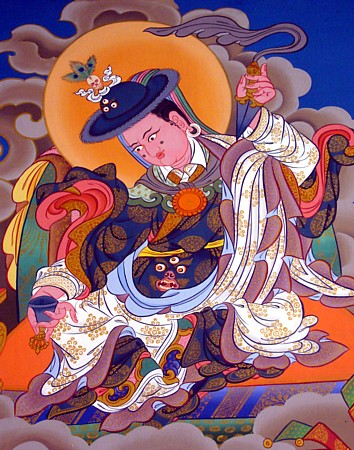Anuyoga: Difference between revisions
No edit summary |
No edit summary |
||
| Line 1: | Line 1: | ||
[[Image:Sangye Yeshe.jpg|frame| | [[Image:Sangye Yeshe.jpg|frame|[[Nupchen Sangyé Yeshé]]]] | ||
'''Anuyoga''' (Skt.; [[Wyl.]] ''rjes su rnal 'byor'') — the second of the [[three yanas of powerful transformative methods]] specific to the [[Nyingma]] school. | |||
==Overview Given by [[Alak Zenkar Rinpoche]]<ref>[http://www.lotsawahouse.org/nine_yanas.html A Brief Presentation of the Nine Yanas by Alak Zenkar Rinpoche]</ref>== | |||
The vehicle of Anuyoga , or ‘following yoga’, is so-called because it mainly teaches the path of passionately pursuing (or ‘following’) [[wisdom]], in the realization that all phenomena are the creative expression of the indivisible unity of [[absolute space]] and [[primordial wisdom]]. | |||
===Entry Point=== | ===Entry Point=== | ||
One’s mind is matured through the thirty-six [[empowerment]]s in which the four rivers—outer, inner, accomplishing and secret—are complete, and one keeps the [[samaya]]s as described in the texts. | One’s mind is matured through the thirty-six [[empowerment]]s in which the four rivers—outer, inner, accomplishing and secret—are complete, and one keeps the [[samaya]]s as described in the texts. | ||
| Line 15: | Line 19: | ||
===Results=== | ===Results=== | ||
At the culmination of Anuyoga’s own uncommon [[five yogas]], which are essentially its five paths, and the [[Ten Stages according to Anuyoga|ten stages]] that are included within these five, one attains the level of [[Samantabhadra]]. | At the culmination of Anuyoga’s own uncommon [[five yogas]], which are essentially its five paths, and the [[Ten Stages according to Anuyoga|ten stages]] that are included within these five, one attains the level of [[Samantabhadra]]. | ||
==Subdivisions== | |||
There are two sections of Anuyoga: | |||
*sutra (Wyl. ''mdo'')<ref>The sutras of Anuyoga are different from the [[shravaka]], [[pratyekabuddha]] and [[bodhisattva]] [[sutra]]s.</ref> and | |||
*agama (Wyl. ''lung''). | |||
==Notes== | |||
<small><references/></small> | |||
[[Category:Key Terms]] | [[Category:Key Terms]] | ||
[[Category:Anuyoga]] | [[Category:Anuyoga]] | ||
[[Category:Nine Yanas]] | [[Category:Nine Yanas]] | ||
Revision as of 12:31, 16 March 2010

Anuyoga (Skt.; Wyl. rjes su rnal 'byor) — the second of the three yanas of powerful transformative methods specific to the Nyingma school.
Overview Given by Alak Zenkar Rinpoche[1]
The vehicle of Anuyoga , or ‘following yoga’, is so-called because it mainly teaches the path of passionately pursuing (or ‘following’) wisdom, in the realization that all phenomena are the creative expression of the indivisible unity of absolute space and primordial wisdom.
Entry Point
One’s mind is matured through the thirty-six empowerments in which the four rivers—outer, inner, accomplishing and secret—are complete, and one keeps the samayas as described in the texts.
View
Through logical reasoning one determines that which is to be known, the fact that all phenomena are characterized as being the three mandalas in their fundamental nature, and realizes that this is so.
Meditation
Meditation practice here consists of two paths. On the path of liberation one practises the non-conceptual samadhi of simply resting in a state that accords with the essence of reality itself, and the conceptual samadhi of deity practice, in which one visualizes the mandala of supporting palace and supported deities simply by reciting the mantra of generation. On the path of skilful means one generates the wisdom of bliss and emptiness through the practices of the upper and lower gateways.
Conduct
One practises the conduct that is beyond adopting or abandoning in the recognition that all perceptions are but the display of the wisdom of great bliss.
Results
At the culmination of Anuyoga’s own uncommon five yogas, which are essentially its five paths, and the ten stages that are included within these five, one attains the level of Samantabhadra.
Subdivisions
There are two sections of Anuyoga:
- sutra (Wyl. mdo)[2] and
- agama (Wyl. lung).
Notes
- ↑ A Brief Presentation of the Nine Yanas by Alak Zenkar Rinpoche
- ↑ The sutras of Anuyoga are different from the shravaka, pratyekabuddha and bodhisattva sutras.